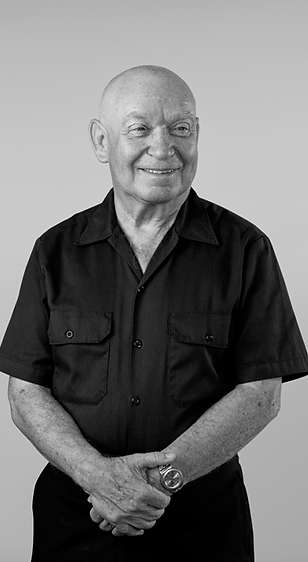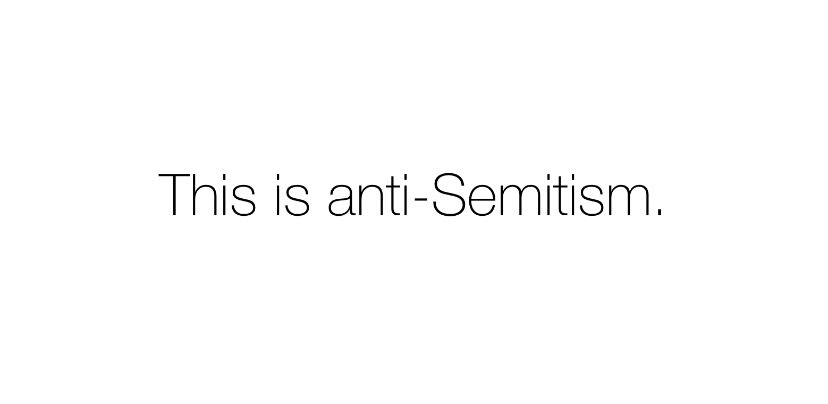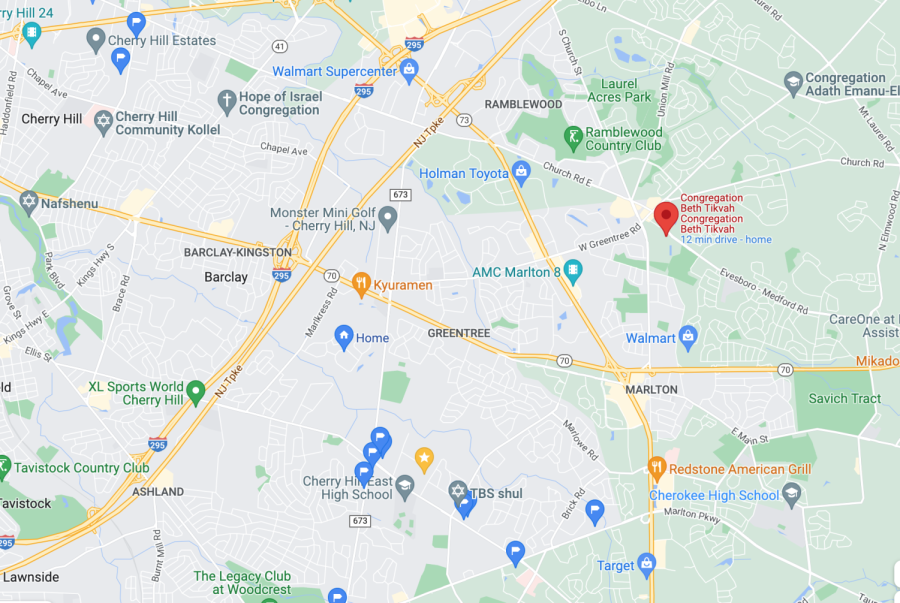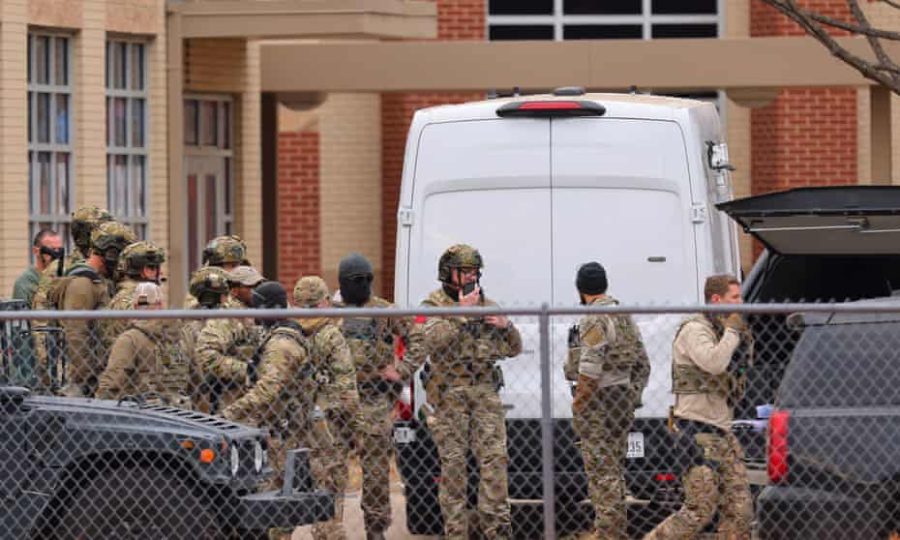Addressing antisemitism
April 3, 2022
Antisemitism is often overlooked. In 2022 and in recent years, places of safety—such as schools and community centers—in Cherry Hill and the rest of the nation have seen multiple antisemitic acts. It is important to educate those behind these actions on the Jewish community, culture, and religion to create a safe environment for all.
Exploring denominations of Judaism
Judaism traces its roots back to around 4,000 years ago, in the Middle East, with the Hebrew people. It began with Abraham and Sarah, the first two historically Jewish figures. At the time, there were no sects (denominations, in the Jewish faith) of Judaism. It was just a singular religion that all Jewish people practiced the same way: by simply following all 613 commandments of the Torah in their everyday life.
As previously stated, though denominations of Judaism did not exist at this time, modern Orthodox Jews practice most similar to the Jewish people of millennia ago. Orthodox Jewish people dedicate their lives to following the commandments of the Torah, which includes practicing a completely restful day on the Sabbath (Friday). Orthodox Jews can do no work on this day. Some other practices of the Orthodox denomination include separating women and men during services as well as dressing modestly.
As time changed, so did the desires of many Jewish people. They no longer wanted to practice exactly as traditional Judaism was always practiced, unlike modern Orthodox Jews. The Enlightenment occurred across Europe, by which Jewish people were subsequently influenced, and the three predominant denominations eventually emerged.
In 1810, Rabbi Abraham Geiger, a German-Jewish scholar, promoted making changes in Jewish society that would simultaneously allow Judaism to continue existing and help Jewish people fit into modern society. Eventually, this led to the creation of the Reform Judaism movement.
Reform Judaism still connects tradition to modern times by upholding the core values of the Torah. Reformed Jewish people are still expected to attend synagogue as regularly as possible, light candles for Shabbat, and pray daily. However, how a Reformed individual goes about practicing their religion is slightly more relaxed, and, of course, individualized. Many Reform Jews work on Fridays or don’t completely keep kosher. Reformed Jewish services also are different from Orthodox services in that they run for a shorter time; combine men and women; use the vernacular, including choral singing; and allow female cantors and rabbis on the bimah.
Conservative Judaism stemmed directly from the creation of Reform Judaism to uphold more traditional values of Orthodox Judaism whilst modernizing Jewish practices. Conservative Jews are expected to follow the Torah relatively literally, keep kosher, and wear the kippah. Services are primarily spoken in Hebrew and have a longer run-time. However, women and men sit together in these services. Conservative Jewish people also often don’t take a completely restful Sabbath.
Reconstructionism and Secular Humanistic Judaism are other smaller, more liberal forms of Judaism.
Despite their differences, at the core of all these denominations is the law of the Torah, the basis of Judaism. Undoubtedly, it always will be.
Judaism has created a lasting impact on Cherry Hill
Vivian Rong (’23) using Google Maps
Cherry Hill is heavily influenced by Judaism. (Blue flags represent places for Jews to come together in culture, religion, or community)
In a world where only 0.19 percent of the population worships Judaism, it’s seemingly shocking that 11,000 of these people live in Cherry Hill, New Jersey, and the areas surrounding the town. For years, the area has been home to a significant Jewish population which has truly left a cultural mark.
In comparison to the rest of the world, Cherry Hill is very densely populated in regard to the number of Jewish people who live in the area. This has resulted in a vast number of Jewish centers, synagogues, and other religious and cultural vicinities finding a home in the town.
Just 0.5 miles from Cherry Hill High School East lies the Jewish Community Center, the JCC, which has become a staple of Jewish life in the region. Jewish Community Centers can be found nationwide, and the local building has so many offerings. The updated building was constructed in 1997 and has since been devoted to offering valuable social programs to the community. The JCC is not only the home of the Sari Isdaner Early Childhood Center and plentiful health and wellness facilities but also so many prominent Jewish events throughout the year. The local JCC draws in exciting guest speakers and hosts events that help to enrich the Jewish community.
The growth in the Jewish population in the Cherry Hill region has also culminated in the creation of the JCC Camps at Medford which has been a Jewish staple for children since 1942. The camp offers an enriching experience full of Jewish concepts and activities for children and counselors to develop their knowledge of the religion. Just twenty minutes from Cherry Hill, the JCC Camps at Medford have been forming lasting memories and summers for Jewish children for years.
It’s also remarkable how Judaism has become so widespread in Cherry Hill over a span of so many years that there are so many synagogues in such close proximity to each other. Just across the street from the JCC lies Temple Emanuel on Springdale Road. Temple Emanuel was formed in 1950 and was the first reform Synagogue to be constructed in Cherry Hill. Further down on Evesham Road sits Congregation M’kor Shalom. This synagogue was formed in 1974 as the Jewish community began to blossom. Eighteen families came together to form the congregation which found its place as a liberal synagogue, falling between the lines of reform and conservative. In May of 2021, it was announced that the two synagogues would be merging, but their respective legacies will continue to live on.
Judaism has also spread down Kresson Road, as Temple Beth Shalom and Chabad Lubavitch sit right next to each other. Temple Beth Shalom’s Cherry Hill location has been present since 1989 with over eight hundred families in their conservative congregation. The temple moved to this town as an effect of the Jewish community continuing to heavily populate the area. The Cherry Hill location of the Chabad was opened in 1993, and it is a temple for Orthodox Jews to take part in their worship. The Chabad looks to help Jewish people participate in the Jewish aspects of their lives through learning and prayer.
Similar to Temple Beth Shalom, Congregation Beth El is also a conservative synagogue. The Voorhees temple opened in 1921 as a place to inspire the Jewish community and to provide them with a place of worship. Seeing how long ago Beth El opened in the area, it is illustrated how the Jewish community has been leaving its mark on the region.
It is remarkable how over time, Jewish facilities have spread throughout Cherry Hill so rapidly to keep up with the ever-growing Jewish community in the town. Dating back to the 1900s, there have been Jewish families located all over the region, and their impact can be seen through the many Synagogues and other centers for Judaism that are located in the area. The Jewish people have created a lasting impact on Cherry Hill as their legacy continues to grow.
Judaism impacts Cherry Hill through community, culture, and religion
Jewish community centers lie on Kresson Road, along with Cherry Hill High School East.
Remembering the Holocaust

Courtesy of Holocaust and Human Rights Education Center
Sami Steigmann works with the Holocaust and Human Rights Education Center.
As a Jewish teen growing up in a world of 21st-century technology and twisted media plots, I have been able to first-hand witness and see that antisemitism is real and still boiling within world hate. Though years after the genocide that we must never forget, attacks on the Jewish community happen daily. My phone beeps with news of a new synagogue attack – like the recent hostage situation in Colleyville, Texas, and the vandalization at Adath Emanu-El Synagogue in Mt. Laurel – or another college campus defaced with slurs and Nazi propaganda. I swipe through Instagram stories to view the newest episode of antisemitism and see my peers advocating for nearly every cause but stopping the one against the Jewish people. It is imperative that we denounce antisemitism along with all other forms of hate; no one should fear their heritage.
Just a few weeks ago, I was able to spend Havdalah, starting the new week, alongside thousands of Jewish teens from around the globe. From South Africa, Australia, to Morocco, and all over North America, I was a part of a movement that came together to lead the world into a better tomorrow.
Through my involvement with the Jewish community worldwide, I have been able to work and connect directly in advocacy groups, and even share special bonds with Holocaust survivors. At this Havdalah, accompanied by their heritage and a younger generation, these men and women were able to sing the songs and prayers they were once persecuted for. The persecution they faced because they, like me, were Jewish. Sharing these bonds, with such experienced and inspiring individuals, means the world to me. Having the Holocaust as a bold reminder of who I am, I feel it is my duty and responsibility, as well as all others, to understand what happened to the Jewish people during World War II and digest it, overcome it, bounce back, and never forget so something so unfortunate and scary never happens again.
Through my Jewish relations, I was able to sit down and digest antisemitism from a survivor like Sami Steigmann, who now encourages all to love and bring about social action. It is important to never be a bystander, and to stand up for what is wrong; genocide happens because it goes unnoticed– the world watches and does nothing.
The stories I have learned from those who endured the confines of the Holocaust stay with me, though, I still see attacks on the Jewish population today– including at places near to me. I am inspired to make a difference and stop the antisemitism that plagues our planet. From these conversations, I know the true desire for a world foiled through peace. I have listened to tails that sting of fear and isolation. So, as the next generation, it is now that we must work together to stop all forms of hate and oppression, and begin to make a difference.
Antisemitism needs to be discussed more
Antisemitism is something that unfortunately almost everyone knows about. I’m fortunate enough to live in a community that has a large Jewish population, I spend my summers at a camp with a large Jewish population, and I spend my free time with my friends from BBYO (a Jewish teen movement group). So it is fair to say that in my everyday life, I don’t see a lot of antisemitism. But unfortunately, my phone connects me with people from all over the world, and not everyone is as accepting as my friends here in Cherry Hill. I’ve seen anti-Israel Instagram posts, I’ve watched YouTube videos of people vandalizing synagogues, and I’ve sympathized with other Jews across the globe as I watched news stories about Pittsburgh, Colleyville, and others.
When I think about my experiences with antisemitism, I don’t think about things I’ve been in the presence of. I think of the 63% of the world that doesn’t know that the Holocaust killed six million Jews. I think about the tears I’ve watched others cry in response to the hatred of others. I think about the time I sat in the sanctuary with my friends writing a school newsletter article speaking out against hate that we never expected to see in our lifetime. I’m tired of living in a world where we all try to shout over each other. It’s time we listen for a change.
Antisemitism occurs at East
People look past antisemitism at East. As a Jew, I’ve had multiple encounters with antisemitism as well as heard what my friends have experienced. One example occurred during chocolate sales my freshman year; someone told my friends and me, “Buy some because you’re Jewish and that means you have money.” This person probably had no idea how offensive this statement was, as he referred to the hateful propaganda that spiraled throughout the world in the 1930s: illustrations of stereotypically Jewish men stealing money from innocent children.
What about the time when someone told my friend, “Go back to the gas chambers,” being completely unaware that there was anything wrong with that statement, or the time when we sat down at our lunch table and someone said, “Oh so the Jews are sitting here now?” This blatant antisemitism spreads around East through not only ignorance but utter insensitivity, and it needs to end. We as a school need to strive to better educate each other and ourselves on the history of the cultures that make up this community, and hold those who spread hatred throughout our school accountable for their actions.
Kresson Road is an integration of Judaism
Move left along Kresson Road facing Temple Beth Sholom to explore Judaism’s impact on Cherry Hill.
Jewish teens are affected by antisemitism
It is crazy to hear from people around me about their experiences and brushes with antisemitism, even living in such a prominently Jewish area. I was at a BBYO (a Jewish teen movement group) event, and we were going around in a circle talking about our experiences, and it’s crazy to me that a group of people in this area, a place where everyone can connect through “Jewish geography,” can still experience this hatred and prejudice from other people.
This program was truly impactful because not one person in the entire circle kept quiet, everybody had something to say. One person, in particular, shared a story about her old school in a much less ‘Jewish’ area. In school, a classmate had come up to her and said “get back in the gas”. When those words were said, I could almost hear the jaws dropping to the floor. People just don’t realize how much of an everyday issue and life experience this is for the Jewish people, and children no less.
Education is key to helping stop antisemitism
Although I haven’t experienced a specific antisemitic event at East that stands out to me, there are definitely a few common phrases that can be heard circulating the school. People commonly say things like “oh, you do look Jewish” or “your nose doesn’t look Jewish”… and although I’ve learned not to take phrases like these too seriously, they do make me feel speechless for a moment.
I have friends who have shared antisemitic remarks made towards them- things like “get back in the oven” or “go back to hiding in the attic”–all of which are blatant references to the Holocaust.
Comments like these make everyone uncomfortable and are used more frequently towards Jews than people realize. I believe overall it just comes from a lack of knowledge that people have… and the tendency to take anger out on minority groups that can be easily targeted by using specific remarks that are undoubtedly going to offend anybody.
Antisemitic comments make Jewish youth feel targeted, reminding us of the denigration that our Jewish ancestors endured for generations. These comments are also clear reminders that society hasn’t changed, and they alarm us about how antisemitic ideology is rapidly spreading as time goes on.
If everyone was properly educated and more socially aware of the extent that their comments leave on people, there would be a better understanding of the history of antisemitic acts and the blatant disrespect which they emanate.
Antisemitism affects Jews nationally
The Anti-Defamation League, (ADL) is the most prominent organization that tracks and records national incidents of antisemitism in the United States. On the ADL website, it states that its mission is “To stop the defamation of the Jewish people, and to secure justice and fair treatment to all…” The ADL has conducted public opinion polls to track American and global attitudes towards Jews over time since 1964. Also, the ADL is widespread across the United States as its organization has 25 regional offices. This way, the ADL is able to respond quickly when antisemitism affects our cities, communities, and campuses.
Antisemitism is on the rise. The ADL website states, “ADL’s most recent Audit of Antisemitic Incidents in the United States recorded more than 2,100 acts of assault, vandalism, and harassment, an increase of 12 percent over the previous year. This is the highest level of antisemitic incidents since ADL’s tracking began in 1979. The year included five fatalities directly linked to antisemitic violence and another 91 individuals targeted in physical assaults.”
The ADL tracks Antisemitic incidents that include recent incidents of Anti-Jewish vandalism, harassment, and assault. These incidents are either reported to or detected by the ADL. The incidents are updated daily.
On February 4 in Brooklyn, New York, an ultra-Orthodox man and woman were walking down a sidewalk on Friday night. Security cameras captured an assailant who trailed behind them in a row of parked cars and struck the man in the back of the head. The assailant knocked the man’s hat to the ground and then fled.
Another antisemitic incident took place over the weekend in Williamsburg. It was reported that vandals sprayed swastikas on school buses for Jewish religious schools. The buses were marked with Hebrew letters.
This antisemitic incident took place on a college campus. On February 3, a swastika was found drawn into the condensation on the glass in Ithaca College’s Baker Hallway.
In Manassas, Virginia on February 2, the police found a swastika spray-painted onto an overpass. The swastika and numbers were visible to drivers who traveled along Prince William Parkway, according to authorities.
On February 2, it was reported to the ADL that a middle-school teacher wrote a transliteration of the Tetragrammaton on the whiteboard and told students, “If you want to torture a Jew, make them say this out loud.”
On February 2, in Danville California, individuals associated with the Goyim Defense League distributed antisemitic propaganda that claimed, “Every single aspect of the Covid agenda is Jewish.”
As it is clear to see, antisemitism is getting worse. These types of incidents happen every day all over the country. The ADL encourages you to speak up and advocate for the Jews in your community. Educate yourself and learn how you can help stop the spread of hate in this world. Talk to friends and family about the consequences of antisemitism. Report incidents of antisemitism to the ADL or your local Jewish community. We can all make a difference and have a positive impact on our world if we are willing to stand up for what is right and educate ourselves.
National antisemitic attacks
Click through the timeline to see a mere portion of the antisemitic attacks that have already occurred in 2022.
Texas Synagogue attacked on January 15, 2022
Antisemitism. It is a phrase that we’ve all heard before. The Oxford Dictionary defines it as “hostility to or prejudice against Jewish people”. It can be in the form of careless name-calling or snarky remarks. It can also be in the form of attacks on the Jewish community. The Texas Synagogue attack that took place on January 15, 2022 is an example that encapsulates this idea of antisemitism perfectly.
On Saturday morning, an attacker made his way into Congregation Beth Israel and took four hostages including the rabbi there. The attack happened in Colleyville, Texas. As he was following through he “was giving ultimatums and deadlines about killing [the] hostages,” said Matthew DeSarno who is the bureau’s top agent in the city of Dallas. The man who entered was armed and had interrupted a religious service that was going on in the building. The SWAT Team interfered with the situation at 10:41 a. m. The standoff with the police lasted for about 10 hours before all the hostages were released Saturday night alive and safely. The gunman was dead.
This attack specifically targeted the Jewish community, making this situation a “terrorism-related matter,” said an official FBI statement given two days after the event. The 1/15 Texas Synagogue Attack is just one of many instances where the Jewish population has been the center of the target. This attack is one that represents the many in which the Jewish community has been made to feel inferior or attacked by their external society, solely for what they choose to believe in.
Amnesty International stays silent on antisemitic issues
Courtesy of The Washington Institute
Boiskin gives his views on Amnesty International and their report on Israel.
Amnesty International, a human rights organization, recently accused the Israeli government of creating and maintaining an apartheid state in a nearly 300-page report. The report, which labels the Israeli government as “an institutionalized regime of systematic oppression and domination over Palestinians,” immediately provoked an outcry from the international Jewish and Zionist community. In Jerusalem, Israel, I met with students from across the world, some of whom hold Israeli citizenship, to find out what they have to say about this.
“Amnesty International claims to be a human rights organization, but they pick and choose when it comes to discrimination. The logic that they cannot campaign for every issue, is simply horrendous,” said Luiz Gandelman, a Jewish individual who holds both Israeli and Brazilian citizenship and lives in Miami, Florida. “They should be combatting all forms of hate, whether it’s islamophobia or antisemitism. Calling Israel an apartheid state does not make sense either, because Israel is nothing like South Africa prior to the early 1990s. In Israel, both Arabs and Israelis can live together, even though I do not agree with everything that the Israeli government does.”
Israel has historically rejected comparisons with apartheid-era South Africa, according to CNN. In South Africa, apartheid was used to strip citizenship from non-Whites and require non-Whites to use a system of identity papers and passes to both travel and work. However, for Arabs and non-Jews in Israel, this system does not exist, says Alex Milman, a Jewish-American citizen in Voorhees, New Jersey, who is looking to obtain Israeli citizenship later this year. “Simply go to Israel, and you will see that in most cases, the people there live together,” says Milman.
Still, some organizations continue to elevate the Palestinian-Israeli conflict to more than just a territorial dispute. For example, the New York-based Human Rights Watch in April last year joined the “growing international movement to redefine the conflict as a struggle for equal rights instead,” according to The Guardian. In response, the Israeli government has continued to insist that its own Arab citizens enjoy and possess equal rights as anyone else.
Gandelman says he can see where some of these organizations are coming from. However, to Gandelman, Amnesty is just a visage, that has wrongfully responded to the Israeli-Palestinian conflict. He recommends that students in Amnesty International clubs across America research more before campaigning about Amnesty-endorsed topics. “My message to students in Amnesty International clubs would be to consider whether or not it’s worth having your name attached to an organization that seems nice on paper, but in reality fails to properly research incredibly sensitive and important topics. You can campaign for human rights without slapping the Amnesty International label on your club or project.”
Meital Brodi, a high school student from Ithaca, New York, spending this semester in Israel, and a dual citizen of both Israel and America, agrees. “Of course, there are issues with the Israeli government, but calling it an apartheid state is wrong. I don’t always support the actions of the government, however, I’ve never witnessed apartheid in action while visiting the country. For example, in the Shuk (the marketplace), I saw people of all different cultures, speaking both Arabic and Hebrew, while mingling, shopping, and simply walking around.”
Jesse Sklar (‘24), a Cherry Hill High School East student, reached out to East’s Amnesty International club for a response on this issue: he was surprised by what they had to say.
“Our student group does not necessarily have a collective stance on the recent report that was published, [and] different members of our group can have different stances on the issue. Our goal is to create a positive impact, and being a chapter of Amnesty allows us to do that,” said a representative of the club.
Sklar says that East’s Amnesty chapter will not create a positive impact by staying silent on this issue. After all, as Elie Wiesel, a famous Holocaust survivor, once said, “What hurts the victim most is not the cruelty of the oppressor, but the silence of the bystander.”





